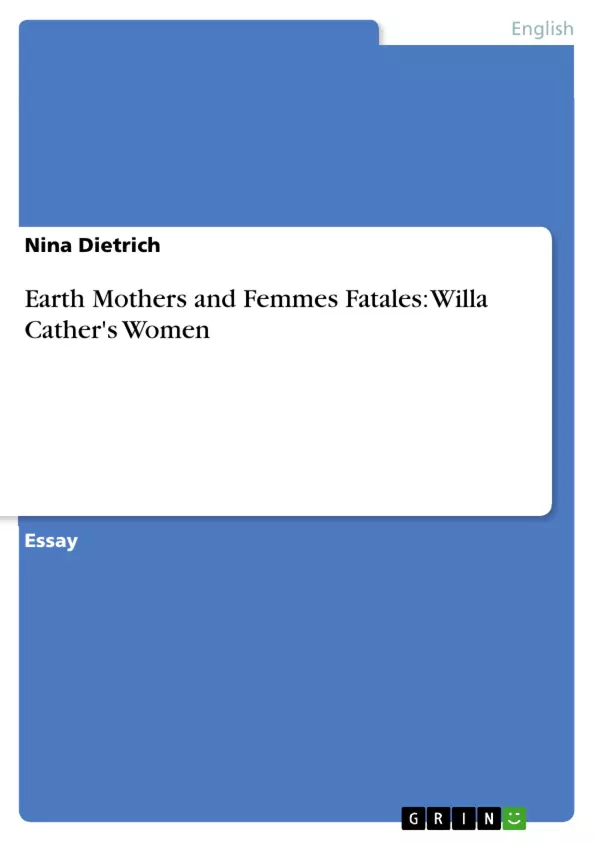According to Evelyn Helmick Hively, Willa Cather’s novels mirror the
author’s ‘broad experience with people from all strata of society’ (Hively 171).
Consequently, Cather’s characters come from diverse cultural and social
backgrounds. It is today regarded as one of the author’s primary literary
achievements that her
… novels reveal a different West and [offer] an alternative direction for
American literature. They spoke for the Midwestern immigrant and the
woman, who had hitherto been silent, and they spoke in the language of an
old culture taking root in a new land. (Thomas 64)
In fact, although Willa Cather’s female characters live on the margins of
American society, they are strong-willed and in control of their destinies. Cather
illustrates that even in the male-dominated, restrictive turn-of-the-century society,
women have a large number of choices and can shape their lives in ways that their
predecessors could not. Harvey remarks tha t “gender … proves an asset in their
efforts to achieve self- fulfilment, helping them turn inward to explore self in a
way that [male characters] never could’ (Harvey 33). Willa Cather’s heroines
construct their own identities to varying degrees, taking advantage of the
opportunities for personal improvement available in frontier and post- frontier
America, often manipulating the established image of womanhood and
challenging traditional views.
Even though all of Cather’s heroines are subject to similar social
expectations and pressures, their lives differ to a great extent. Cather shows that
there is more than one way in which the pioneer woman can seek self- fulfilment.
In order to illustrate this, the essay will analyse four heroines, that is, Alexandra
Bergson from Cather’s 1913 novel O Pioneers!, Ántonia Shimerda (later Cuzak)
and Lena Lingard from My Ántonia and Marian Forrester from A Lost Lady. All
of these characters live in rural Nebraska in or, in Marian Forrester’s case, at the
end of the pioneer era. Harvey states that at that time, a
woman was supposed to fill a variety of roles, all primarily for the purpose
of helping a man achieve his American Dream. [...]
Table of Contents
- Introduction
- Alexandra Bergson
- Masculinity and Femininity
- Family Relationships and Independence
- Alexandra and Carl
- Alexandra's Dual Role
- Ántonia Shimerda
- The Bohemian Earth Mother
- Ántonia's Relationship with Nature
- Ántonia and Jim Burden
- The Influence of the Past
- Lena Lingard
- The New Woman
- Lena's Relationship with Ántonia
- Lena's Independence
- Marian Forrester
- The Femme Fatale
- Marian's Relationship with Frank Shabata
- Marian's Self-Fulfillment
Objectives and Key Themes
This essay aims to analyze the portrayal of women in Willa Cather's novels, focusing on their struggles for independence and self-fulfillment within the restrictive society of early twentieth-century America. Through an examination of four key characters—Alexandra Bergson, Ántonia Shimerda, Lena Lingard, and Marian Forrester—the essay explores how these women navigate societal expectations and construct their own identities, defying traditional roles and challenging literary conventions of the era.
- The roles and limitations of women in early twentieth-century America
- The tension between feminine and masculine traits
- The concept of self-fulfillment and its relationship to independence
- The complexities of family and community relationships
- The influence of nature and the frontier experience on female characters
Chapter Summaries
The essay begins by analyzing the character of Alexandra Bergson from Cather's 1913 novel O Pioneers!. Alexandra is presented as a strong, independent woman who embodies both masculine and feminine traits. Her relationship with her family, particularly her father and younger brother Emil, highlights the tension between her desire for independence and her longing for connection. The essay explores how Alexandra's dual role as both farmer and provider for her family and as a woman seeking personal fulfillment shapes her character.
The next chapter examines the character of Ántonia Shimerda, the Bohemian "earth mother" from My Ántonia. The essay explores how Ántonia's relationship with nature, her community, and her connection to the past influence her life. The chapter also analyzes her complex relationship with Jim Burden and the impact of their shared experiences on both of their lives.
The essay then turns to Lena Lingard, another character from My Ántonia who embodies the emerging "New Woman" of the early twentieth century. The chapter explores Lena's independence, her relationship with Ántonia, and her journey towards self-discovery.
Finally, the essay analyzes the character of Marian Forrester from A Lost Lady. Marian is presented as a femme fatale who defies societal expectations and seeks her own form of self-fulfillment. The chapter explores her complex relationship with Frank Shabata and the consequences of her choices.
Keywords
The primary keywords and focus topics of this essay include: Willa Cather, American Modernism, women's literature, female characters, pioneer women, independence, self-fulfillment, societal expectations, family relationships, nature, the frontier, and literary conventions.
Frequently Asked Questions
How does Willa Cather portray women in her novels?
Cather portrays women as strong-willed individuals who control their own destinies, even in restrictive, male-dominated societies.
Who are the four main heroines analyzed in the essay?
Alexandra Bergson (O Pioneers!), Ántonia Shimerda, Lena Lingard (My Ántonia), and Marian Forrester (A Lost Lady).
What is the "Earth Mother" archetype in Cather's work?
Represented by Ántonia Shimerda, it describes a woman deeply connected to nature, family, and the past, embodying fertility and endurance.
What defines the "New Woman" in the context of Lena Lingard?
Lena represents independence and self-fulfillment through career and personal choice, breaking away from traditional domestic roles.
How does Marian Forrester differ from other heroines?
Marian is portrayed as a "femme fatale" who challenges societal expectations at the end of the pioneer era, seeking her own fulfillment in complex ways.
- Quote paper
- Nina Dietrich (Author), 2004, Earth Mothers and Femmes Fatales: Willa Cather's Women, Munich, GRIN Verlag, https://www.grin.com/document/21647



